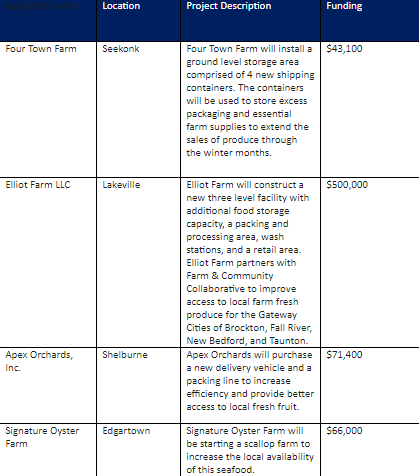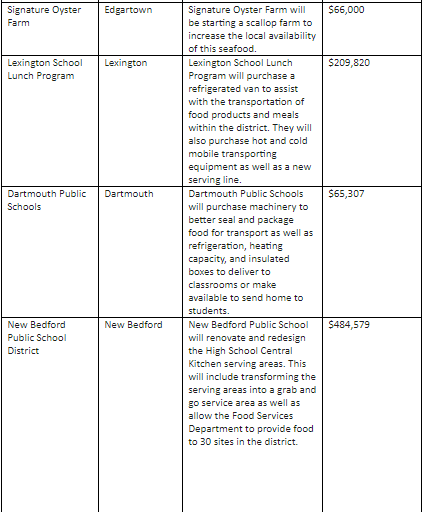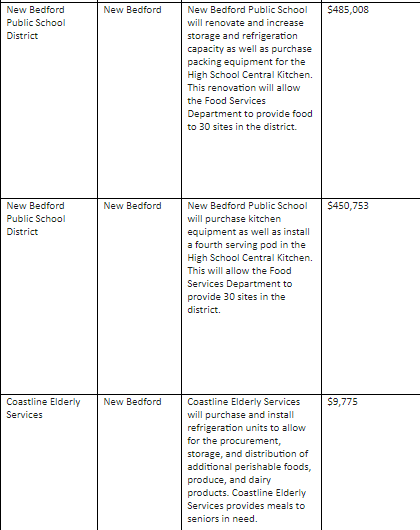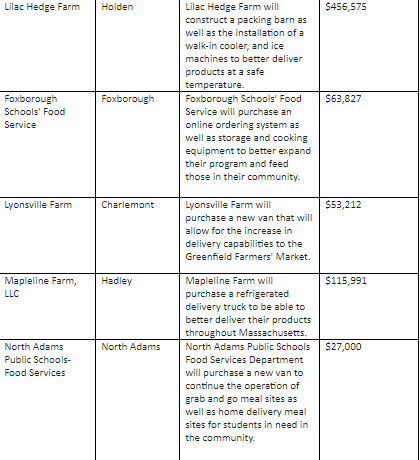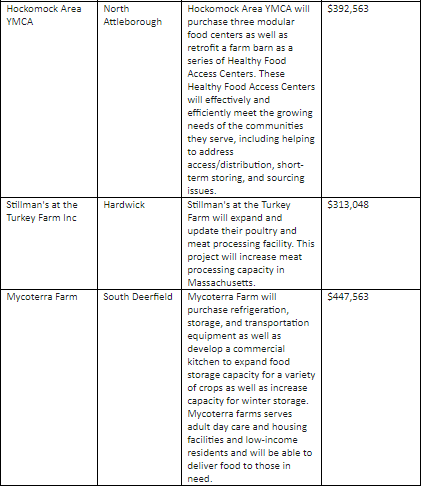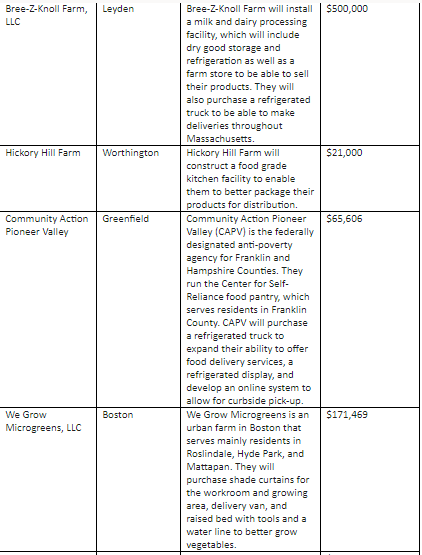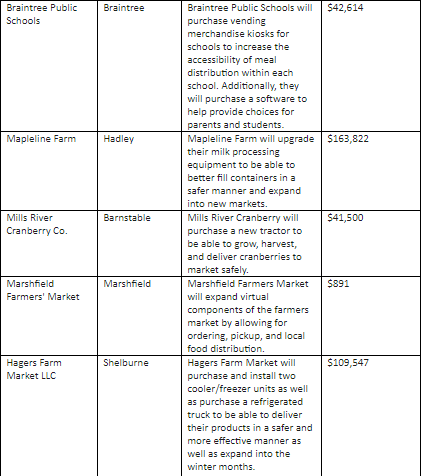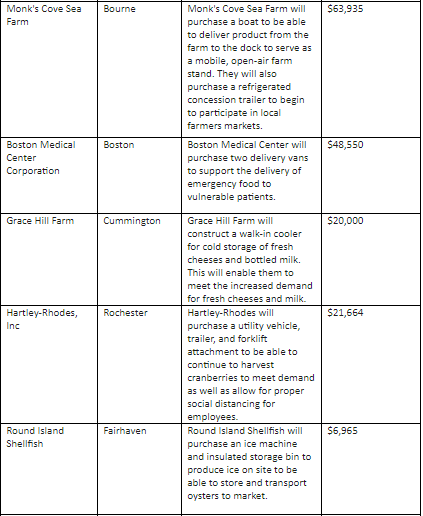Are you looking for a shipping solution? Maybe you need to change freight carriers? Find out what the hard working and reliable people at Team Worldwide can do over land, sea and air
Baker-Polito Administration Awards Over $5.5 Million to Improve Food Security in Massachusetts
BOSTON – Building on efforts to ensure a resilient, secure food supply chain in the Commonwealth, the Baker-Polito Administration today announced over $5.5 million in grants to address urgent food insecurity for Massachusetts residents as a result of the COVID-19 pandemic. This funding is being awarded as part of the third round of the new $36 million Food Security Infrastructure Grant Program, created following recommendations from the Administration’s COVID-19 Command Center’s Food Security Task Force, which promotes ongoing efforts to ensure that individuals and families throughout the Commonwealth have access to healthy, local food.
“As families across the Commonwealth continue to adjust to the impacts of the COVID-19 pandemic, it is essential that we support the Commonwealth’s food supply chain and increase access to fresh, local food,” said Governor Charlie Baker. “We are pleased to build on the success of this grant program, which is making critical investments that strengthen our local food system and ensuring its resilience to future challenges.”
“These grants will help Massachusetts families, especially those in underserved communities, access the nutritious food produced by the Commonwealth’s local food system more easily,” said Lt. Governor Karyn Polito. “Strengthening food security in the Commonwealth will not only benefit families across the Commonwealth, but will also address the economic impacts of the pandemic on the state’s food supply chain.”
The goal of the Food Security Infrastructure Grant Program is to ensure that individuals and families throughout the Commonwealth have equitable access to food, especially local food. The program also seeks to ensure that farmers, fishermen and other local food producers are better connected to a strong, resilient food system to help mitigate future food supply and distribution disruption.
The third round of the grant program includes 33 awards totaling $5,551,387 to fund investments in technology, equipment, increased capacity, and other assistance to help producers distribute food, especially to food insecure communities. When evaluating the applications, considerations included equity, economic impact and need, sustainability and scalability of efforts, and ability to support producer readiness to accept SNAP and HIP benefits. In the program’s first two rounds, the Administration awarded a total of $6,266,187 to 60 recipients.
“While Massachusetts continues to progress in its response to the COVID-19 pandemic, many families throughout the Commonwealth continue to struggle with food insecurity during this challenging time,” said Secretary of Energy and Environmental Affairs Kathleen Theoharides. “The grants awarded through this program represent a significant investment in the Commonwealth’s local food system, providing needed resources to our farmers, fishermen, and local food producers that will lead to economic activity while securing a diverse local food supply that will benefit residents throughout Massachusetts.”
Eligible grantees include entities that are part of the Massachusetts local food system including production, processing and distribution, the emergency food distribution network, Buy Local, community and food organizations, school meal programming, urban farms and community gardens, non-profits, and organizations that provide business planning, technical assistance and information technology services. The Request for Responses for project proposals closed on September 15, 2020. Applications submitted before the proposal deadline will continue to be evaluated for future rounds of funding.
“The Commonwealth’s COVID-19 Command Center Food Security Task Force has been working to address increased food insecurity for families as a result of the COVID-19 pandemic, building on and strengthening the infrastructure in place, and leveraging existing nutrition resources like SNAP, WIC, and the new P-EBT,” said COVID-19 Response Command Center Director and Secretary of Health and Human Services Marylou Sudders. “These grants further strengthen the food system in Massachusetts, increasing access across the Commonwealth to support residents.”
The Commonwealth’s Food Security Task Force’s work is focused on ensuring that food insecurity and food supply needs are addressed during the COVID-19 public health emergency and into the long-term, including setting up more than 1,500 grab and go meal sites at schools across the Commonwealth, investing $5 million in the Healthy Incentives Program to bring on new retailers, launching the SNAP Online Purchasing Program to allow SNAP recipients to use their benefits to buy groceries online from Walmart and Amazon, with over $9 million in transactions to date, issuing emergency SNAP benefits to more than 240,000 households to bring all SNAP recipients to their maximum benefit amount, bringing more than $210 million of federal dollars into the state, and leveraging federal flexibilities for SNAP and WIC to make it easier for households to get benefits. WIC flexibilities will continue through the end of the calendar year.
The Administration also announced approval for September Pandemic EBT, or P-EBT, benefits, to help cover the cost of missed school meals from the month of September due to delayed school opening or remote learning for over 470,000 students and their families. Benefits will start being available September 30, 2020 for an estimated total amount of over $40 million of federal dollars. P-EBT benefits supplement the free meals. Additionally, the majority of Massachusetts Supplemental Nutrition Assistance Program (SNAP) participants will see an increase in their benefits starting October 1, 2020 due to the annual cost of living adjustment. The maximum monthly SNAP benefits will be increasing 5% to reflect the recent increase in food prices, making these maximum benefits the highest they have been in the history of the program. This will also increase the amount of emergency SNAP benefits that households have been receiving monthly since March.
This grant program implements the recommendations of the Food Security Task Force, which was convened by the Massachusetts COVID-19 Command Center in response to increased demands for food assistance. The task force is composed of a broad group of public and private members charged with ensuring food insecurity and food supply needs are addressed during the COVID-19 public health emergency.
“This pandemic has shown the gaps in the food chain and these grants will help to close that gap,” said Senator Anne M. Gobi, Chair of the Joint Committee on Environment, Natural Resources and Agriculture. “I am thankful to all the grant recipients for doing their part towards a more sustainable food security future.”
“There has never been a more important time to support families struggling with food insecurity,” said Senator Michael J. Rodrigues, Chair of the Senate Committee on Ways and Means. “I applaud the Baker-Polito Administration for striving to direct Food Security Infrastructure Grant Program funding toward the areas that can help the most people have access to healthy food in their community, including many important projects on the South Coast.”
“Elliot Farm has become a critical link to providing fresh vegetables to our region,” said Representative Norman Orrall. “I am very excited to see their grant award for food security infrastructure become a reality.”
“Thank you to the Baker-Polito Administration for recognizing the ongoing need and challenges so many face regarding food insecurity - especially during the pandemic. I cannot stress enough the incredible value of this program, and the countless individuals and families who will benefit from it,” said Representative Kimberly Ferguson. “Special thanks and congratulations to Lilac Hedge Farm for their ongoing hard work, commitment, and innovation within our community. They are true role models.”
The Food Insecurity Infrastructure Grant Program was announced in May 2020 as part of a $56 million investment by the Baker-Polito Administration to combat urgent food insecurity for some Massachusetts families and individuals as a result of COVID-19. The Administration also announced a $5 million increase for the Healthy Incentives Program to meet increased demand for local produce and to increase access points that process SNAP and HIP benefits, $12 million for the provision of 25,000 family food boxes per week through a regional food supply system, and $3 million in funding as an immediate relief valve to food banks.
In August, the Baker-Polito Administration launched the MassGrown Exchange, an online platform designed to facilitate business-to-business connections within the local food system for products and services. Developed by the Massachusetts Department of Agricultural Resources (MDAR), in collaboration with the Division of Marine Fisheries (DMF), this platform was established to both address COVID-19 disruptions to the local food supply and to serve as a helpful tool and resource for Massachusetts growers and producers in accessing markets beyond the duration of the COVID-19 emergency.
The awardees for the third round of the Food Security Infrastructure Grant Program include:
“As families across the Commonwealth continue to adjust to the impacts of the COVID-19 pandemic, it is essential that we support the Commonwealth’s food supply chain and increase access to fresh, local food,” said Governor Charlie Baker. “We are pleased to build on the success of this grant program, which is making critical investments that strengthen our local food system and ensuring its resilience to future challenges.”
“These grants will help Massachusetts families, especially those in underserved communities, access the nutritious food produced by the Commonwealth’s local food system more easily,” said Lt. Governor Karyn Polito. “Strengthening food security in the Commonwealth will not only benefit families across the Commonwealth, but will also address the economic impacts of the pandemic on the state’s food supply chain.”
The goal of the Food Security Infrastructure Grant Program is to ensure that individuals and families throughout the Commonwealth have equitable access to food, especially local food. The program also seeks to ensure that farmers, fishermen and other local food producers are better connected to a strong, resilient food system to help mitigate future food supply and distribution disruption.
The third round of the grant program includes 33 awards totaling $5,551,387 to fund investments in technology, equipment, increased capacity, and other assistance to help producers distribute food, especially to food insecure communities. When evaluating the applications, considerations included equity, economic impact and need, sustainability and scalability of efforts, and ability to support producer readiness to accept SNAP and HIP benefits. In the program’s first two rounds, the Administration awarded a total of $6,266,187 to 60 recipients.
“While Massachusetts continues to progress in its response to the COVID-19 pandemic, many families throughout the Commonwealth continue to struggle with food insecurity during this challenging time,” said Secretary of Energy and Environmental Affairs Kathleen Theoharides. “The grants awarded through this program represent a significant investment in the Commonwealth’s local food system, providing needed resources to our farmers, fishermen, and local food producers that will lead to economic activity while securing a diverse local food supply that will benefit residents throughout Massachusetts.”
Eligible grantees include entities that are part of the Massachusetts local food system including production, processing and distribution, the emergency food distribution network, Buy Local, community and food organizations, school meal programming, urban farms and community gardens, non-profits, and organizations that provide business planning, technical assistance and information technology services. The Request for Responses for project proposals closed on September 15, 2020. Applications submitted before the proposal deadline will continue to be evaluated for future rounds of funding.
“The Commonwealth’s COVID-19 Command Center Food Security Task Force has been working to address increased food insecurity for families as a result of the COVID-19 pandemic, building on and strengthening the infrastructure in place, and leveraging existing nutrition resources like SNAP, WIC, and the new P-EBT,” said COVID-19 Response Command Center Director and Secretary of Health and Human Services Marylou Sudders. “These grants further strengthen the food system in Massachusetts, increasing access across the Commonwealth to support residents.”
The Commonwealth’s Food Security Task Force’s work is focused on ensuring that food insecurity and food supply needs are addressed during the COVID-19 public health emergency and into the long-term, including setting up more than 1,500 grab and go meal sites at schools across the Commonwealth, investing $5 million in the Healthy Incentives Program to bring on new retailers, launching the SNAP Online Purchasing Program to allow SNAP recipients to use their benefits to buy groceries online from Walmart and Amazon, with over $9 million in transactions to date, issuing emergency SNAP benefits to more than 240,000 households to bring all SNAP recipients to their maximum benefit amount, bringing more than $210 million of federal dollars into the state, and leveraging federal flexibilities for SNAP and WIC to make it easier for households to get benefits. WIC flexibilities will continue through the end of the calendar year.
The Administration also announced approval for September Pandemic EBT, or P-EBT, benefits, to help cover the cost of missed school meals from the month of September due to delayed school opening or remote learning for over 470,000 students and their families. Benefits will start being available September 30, 2020 for an estimated total amount of over $40 million of federal dollars. P-EBT benefits supplement the free meals. Additionally, the majority of Massachusetts Supplemental Nutrition Assistance Program (SNAP) participants will see an increase in their benefits starting October 1, 2020 due to the annual cost of living adjustment. The maximum monthly SNAP benefits will be increasing 5% to reflect the recent increase in food prices, making these maximum benefits the highest they have been in the history of the program. This will also increase the amount of emergency SNAP benefits that households have been receiving monthly since March.
This grant program implements the recommendations of the Food Security Task Force, which was convened by the Massachusetts COVID-19 Command Center in response to increased demands for food assistance. The task force is composed of a broad group of public and private members charged with ensuring food insecurity and food supply needs are addressed during the COVID-19 public health emergency.
“This pandemic has shown the gaps in the food chain and these grants will help to close that gap,” said Senator Anne M. Gobi, Chair of the Joint Committee on Environment, Natural Resources and Agriculture. “I am thankful to all the grant recipients for doing their part towards a more sustainable food security future.”
“There has never been a more important time to support families struggling with food insecurity,” said Senator Michael J. Rodrigues, Chair of the Senate Committee on Ways and Means. “I applaud the Baker-Polito Administration for striving to direct Food Security Infrastructure Grant Program funding toward the areas that can help the most people have access to healthy food in their community, including many important projects on the South Coast.”
“Elliot Farm has become a critical link to providing fresh vegetables to our region,” said Representative Norman Orrall. “I am very excited to see their grant award for food security infrastructure become a reality.”
“Thank you to the Baker-Polito Administration for recognizing the ongoing need and challenges so many face regarding food insecurity - especially during the pandemic. I cannot stress enough the incredible value of this program, and the countless individuals and families who will benefit from it,” said Representative Kimberly Ferguson. “Special thanks and congratulations to Lilac Hedge Farm for their ongoing hard work, commitment, and innovation within our community. They are true role models.”
The Food Insecurity Infrastructure Grant Program was announced in May 2020 as part of a $56 million investment by the Baker-Polito Administration to combat urgent food insecurity for some Massachusetts families and individuals as a result of COVID-19. The Administration also announced a $5 million increase for the Healthy Incentives Program to meet increased demand for local produce and to increase access points that process SNAP and HIP benefits, $12 million for the provision of 25,000 family food boxes per week through a regional food supply system, and $3 million in funding as an immediate relief valve to food banks.
In August, the Baker-Polito Administration launched the MassGrown Exchange, an online platform designed to facilitate business-to-business connections within the local food system for products and services. Developed by the Massachusetts Department of Agricultural Resources (MDAR), in collaboration with the Division of Marine Fisheries (DMF), this platform was established to both address COVID-19 disruptions to the local food supply and to serve as a helpful tool and resource for Massachusetts growers and producers in accessing markets beyond the duration of the COVID-19 emergency.
The awardees for the third round of the Food Security Infrastructure Grant Program include:
